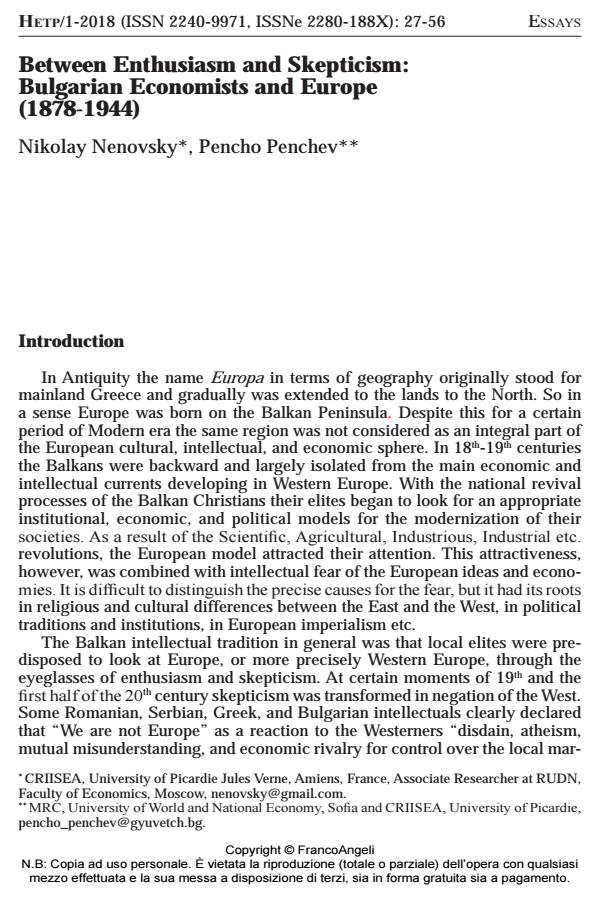Between Enthusiasm and Skepticism: Bulgarian Economists and Europe (1878-1944)
Journal title HISTORY OF ECONOMIC THOUGHT AND POLICY
Author/s Nikolay Nenovsky, Pencho Penchev
Publishing Year 2018 Issue 2018/1
Language English Pages 29 P. 27-55 File size 273 KB
DOI 10.3280/SPE2018-001002
DOI is like a bar code for intellectual property: to have more infomation
click here
Below, you can see the article first page
If you want to buy this article in PDF format, you can do it, following the instructions to buy download credits

FrancoAngeli is member of Publishers International Linking Association, Inc (PILA), a not-for-profit association which run the CrossRef service enabling links to and from online scholarly content.
In this article, we present the discussions of Bulgarian economists as regards the strategic development opportunities of the Balkans and Bulgaria in particular within Europe. We focus on the integration efforts of Bulgaria within an economic unit larger than national market during the decades of the so-called first Bulgarian capitalism. Those are the years since the Liberation of Bulgaria from the Ottoman rule in 1878 to the forced imposition of the Communist regime in 1944. The public expenditures on bureaucracy, army, foreign policy etc. increased after Bulgaria’s Liberation. The integration efforts on Bulgarian side were an attempt to ameliorate some negative consequences of the lost "public goods" of being part of the Ottoman Empire. This was the main source of the Bulgarian economists’ pro-European enthusiasm. However, the enthusiasm was combined with skepticism. The main fuel of skepticism came from the fear that industrially developed countries of Central and Western Europe would not allow the industrialization or modernization of the Bulgarian economy. The presentation follows the historical stages of development of the Bulgarian economy and society. It starts from the late pre-liberation era goes through the late 19th and early 20th-century ideas for Balkan economic integration, the World War I, and the Great Depression effects, and finishes with the Second World War.
Keywords: Balkans Integration, Bulgarian Economic Thought, History of Bulgarian Economic Policy.
Jel codes: B1, B2, N43, N44, F15
- Lending of Last Resort, Moral Hazard and Twin Crises: Lessons from the Bulgarian Financial Crisis 1996/1997 Michael Berlemann, Kalin Hristov, Nikolay Nenovsky, in SSRN Electronic Journal /2002
DOI: 10.2139/ssrn.313192
Nikolay Nenovsky, Pencho Penchev, Between Enthusiasm and Skepticism: Bulgarian Economists and Europe (1878-1944) in "HISTORY OF ECONOMIC THOUGHT AND POLICY" 1/2018, pp 27-55, DOI: 10.3280/SPE2018-001002